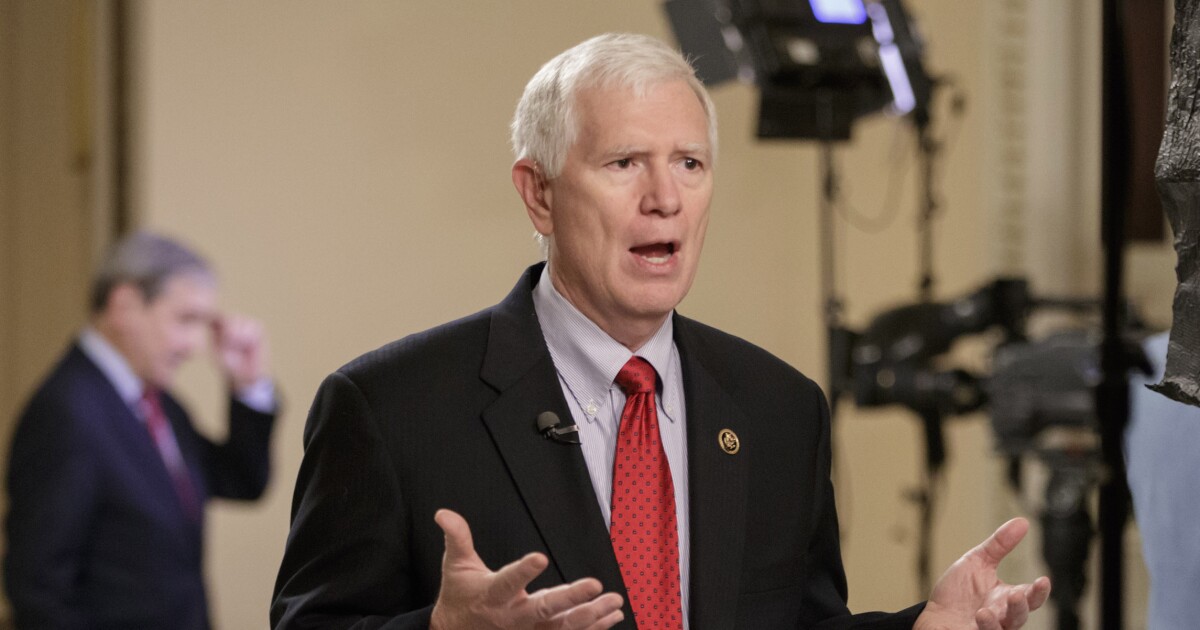

Katie Britt and Rep. Mo Brooks (R-AL) are squabbling over who pulled the plug on the one scheduled debate ahead of the Alabama Senate runoff as both Republicans jockey for advantage in a contest that will essentially determine Sen. Richard Shelby’s (R-AL) successor.
Brooks, the underdog after finishing 15.5 percentage points behind Britt in last month’s primary, is accusing the front-runner of “being too scared to debate” and claiming she is responsible for canceling a media-hosted faceoff previously set for one week before the June 21 runoff. The Britt campaign is calling the congressman a liar, arguing he is “desperate” to improve his runoff prospects and would use any debate as a platform to launch ad hominem attacks.
“If she is too weak to stand on a stage and take Mo Brooks on, how can anyone expect her to take on Chuck Schumer, Bernie Sanders, or any of the other Socialist Democrats that are destroying America,” Brooks said Thursday in a statement, referring to Senate Majority Leader Charles Schumer (D-NY) and Sen. Bernie Sanders (I-VT).
“Katie Britt’s debate refusal is an admission of profound weakness at a time America needs fighters in the U.S. Senate, not pushovers,” Brooks added.
MCCONNELL-LINKED GROUP SPENDS $17.1 MILLION VS. DEMOCRATIC GEORGIA SEN. WARNOCK
“Mo Brooks doesn’t want a debate; he wants a circus,” countered Britt campaign spokesman Sean Ross in a statement. “Katie won’t participate in the final circus act of Mo’s career — she will continue to work tirelessly and travel to every corner of Alabama to share her conservative message, listen to Alabamians, and answer their questions.”
Exactly who deserves blame for the canceled debate is unclear.
On Wednesday, the owner and publisher of the Alabama Daily News, Todd Stacy, said in a Twitter post that he was “disappointed to announce” that the debate his newspaper was hosting along with Gray Television “would no longer happen.” Stacy tweeted, “We had a solid date with both candidates but that has fallen through.” The scheduling of the debate was first announced on May 24, the same day as the May 24 primary.
Shelby, 88, the top Republican on the Senate Appropriations Committee, is retiring at year’s end after representing Alabama in the Senate for more than three decades. Because the state is overwhelmingly Republican, the winner of the runoff is almost assured of winning the general election in November.
Britt, formerly Shelby’s chief of staff, finished first in the state’s GOP Senate primary with 44.7% of the vote, a strong performance but short of the 50% she needed to avoid a runoff with Brooks, who garnered 29.2%. Britt won 62 of 67 counties, going from an unknown political insider at the outset of the campaign last summer to the well-known favorite for the nomination heading into this month’s runoff.
This week, Britt has collected endorsements from Sen. Tom Cotton (R-AR) and Arkansas Republican gubernatorial nominee Sarah Huckabee Sanders, both allies of former President Donald Trump, and Sen. Joni Ernst (R-IA). Britt has run as a staunch conservative and Washington outsider but enjoys the support of the Republican establishment on Capitol Hill. The same is true of GOP insiders in Alabama, who fear Brooks would diminish the legislative clout the state has enjoyed under Shelby.
For Brooks, just advancing to the runoff was something of an accomplishment. As the congressman is fond of saying, he was left for political dead after Trump rescinded his endorsement in March. But he pulled out of what appeared to be a downward spiral in the primary to outpace third-place finisher and onetime front-runner Mike Durant. His challenge in the runoff is to turn that momentum into victory across Alabama.
That could be a tall order for a candidate who exhibited only regional appeal in the primary. Of the five counties Brooks won — and he won them only narrowly — three were clustered in the northern Alabama 5th Congressional District, which he represents in the House.
CLICK HERE TO READ MORE FROM THE WASHINGTON EXAMINER
It’s not as though Brooks is an unknown commodity. His first Senate bid came just five years ago in a 2017 special election.







